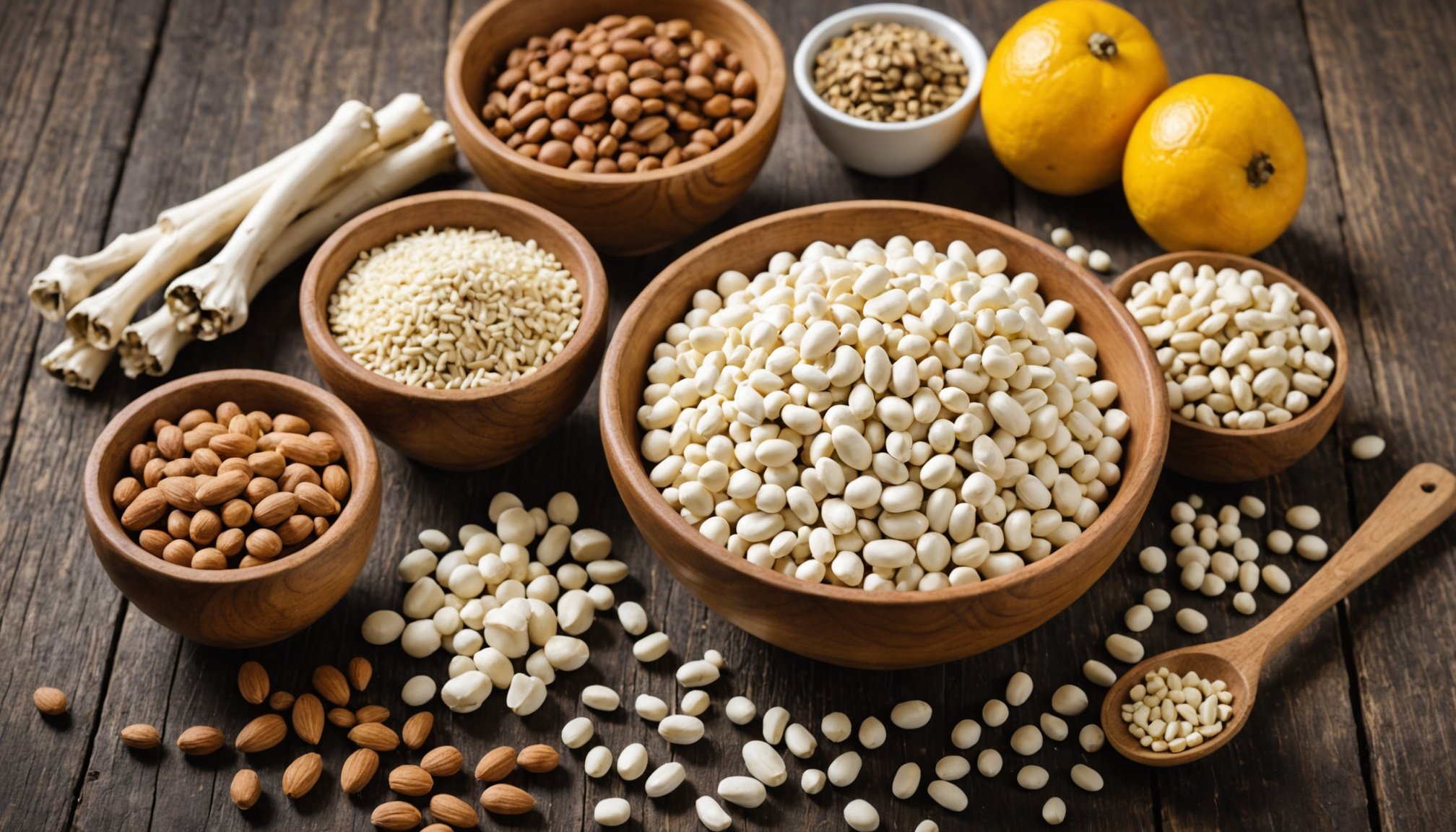Overview of Non-Dairy Calcium Sources
Calcium is pivotal for bone health, especially for menopausal women. During menopause, women face hormonal changes that increase their risk for osteoporosis. Despite the importance of calcium, dietary restrictions or preferences often lead to excluding dairy, which traditionally serves as a major source of this essential mineral. For those not consuming dairy, identifying alternative calcium sources becomes crucial.
Non-dairy calcium sources are not just substitutes but vital components in maintaining optimal health during menopause. These sources range from leafy greens and nuts to fortified plant-based milks and legumes, offering diverse options that fit various dietary needs and preferences. Each non-dairy source comes with unique nutritional benefits, promoting bone health and overall wellness.
Topic to read : Essential Tips for Choosing Eco-Friendly Jewelry: Your Ultimate Guide to Sustainable Selections
The incorporation of non-dairy foods in menopausal nutrition ensures adequate intake of calcium, safeguarding skeletal well-being. By exploring a variety of plant-based options, individuals can enjoy a comprehensive and balanced diet. This dietary approach helps in meeting calcium requirements without relying on dairy products and adapts to diverse lifestyles and dietary choices. Thus, embracing non-dairy alternatives is not just about substitution but about nourishing the body in a sustainable, empowering way.
Top Essential Non-Dairy Calcium-Rich Foods
Menopausal nutrition requires careful consideration, especially regarding calcium-rich foods for menopause. Identifying non-dairy options is pivotal for maintaining bone health. Below are key sources to explore:
Have you seen this : Rejuvenate Your Body: Must-Know Cool Down Techniques After High-Intensity Cardio Workouts
Leafy Green Vegetables
Greens like kale and collard are calcium powerhouses. They offer a nutritional profile rich in vitamins K and C, essential for bone density. Easily incorporated into salads or smoothies, these greens enhance menopausal wellness.
Fortified Plant-Based Milks
Fortified milks vary in calcium levels. Almond, soy, and oat options provide essential nutrients for bone health. When selecting, check labels for calcium and vitamin D content. These are versatile for cooking or morning cereals.
Tofu and Tempeh
Tofu and tempeh are soy-derived, calcium-laden foods. They add variety to your diet. Packed with protein, they can be grilled, stir-fried, or blended into meals to optimize intake.
Nuts and Seeds
Almonds and chia seeds are rich in calcium. Beyond bone support, they contribute to heart health and immune function. Sprinkle them over yogurt, cereal, or salads for a nutritional boost.
Legumes
White beans and lentils are excellent sources. Beneficial for menopausal women, legumes are protein-rich and versatile. They can feature prominently in soups, stews, and salads.
Nutritional Information and Health Benefits
Understanding the nutritional benefits of non-dairy calcium sources is crucial for maintaining bone health, especially during menopause. Calcium plays an indispensable role in skeletal health by supporting bone density and reducing the risk of fractures. For menopausal women, adequate calcium intake is more than just essential; it’s vital.
Aside from calcium itself, other nutrients contribute significantly to bone health. Vitamin D aids calcium absorption, while magnesium and phosphorus are integral to bone structure. Incorporating foods rich in these nutrients can amplify their benefits, fostering a robust skeletal framework.
Expert recommendations suggest that menopausal women aim for a daily calcium intake suited to their age and dietary needs. Generally, a target of 1,200 mg of calcium per day is considered beneficial. However, consulting with healthcare professionals ensures tailored advice that considers individual health conditions and lifestyle factors.
Prioritising menopausal wellness involves more than just mineral intake. It’s about adopting a balanced diet that supports overall health and vitality. Addressing dietary preferences and restrictions with diverse, nutritious options can help manage menopause’s challenges while promoting long-term wellbeing. Emphasising varied non-dairy calcium sources aids in achieving these goals.
Meal Ideas and Incorporation Tips
Incorporating calcium into diet during menopause can be enriching and versatile. Here, we’ll explore engaging meal ideas to effortlessly include non-dairy calcium sources.
Breakfast Ideas
Start your day with a calcium-rich smoothie. Blend kale or collard greens with fortified almond milk, a banana, and a handful of chia seeds for an energising kick. Alternatively, try fortified cereal topped with fresh fruit. Adding a sprinkle of chopped almonds provides extra nutrients and crunch.
Lunch Suggestions
For lunch, consider a bright, calcium-laden salad. Toss in leafy greens, nuts, and beans. Tofu-based wraps with assorted vegetables offer a hearty alternative; dress them with your favourite sauces for variety, while ensuring they remain healthy.
Snack Options
For satisfying snacks, create a vibrant mix of seeds and dried fruit. Explore calcium-rich energy bars, easily packed for busy days. A small bowl of plant-based yogurt is another delightful choice, enjoyable with crushed nuts.
Dinner Recipes
Conclude with a nutritious dinner. Featuring fortified plant-based milks, creamy sauces can accompany tasty vegetable dishes. Opt for a tofu stir-fry filled with colourful vegetables or a comforting stew packed with legumes and greens, guaranteeing ample calcium intake.
Expert Advice and Studies
Navigating osteoporosis prevention during menopause is pivotal. Expert recommendations focus on incorporating non-dairy calcium sources to support bone health. Recent studies demonstrate the efficacy of diverse calcium-rich foods, with findings emphasizing the benefits for menopausal women.
Research studies highlight that non-dairy sources like fortified plant-based milks can match or, in some cases, surpass the calcium contribution of traditional dairy, especially when integrated into a balanced diet. Nutritionists stress the importance of reading labels to ensure adequate calcium levels and other vital nutrients such as vitamin D and magnesium, which work synergistically to bolster bone integrity.
Experts recommend regular calcium intake and suggest monitoring bone density through medical check-ups to preempt potential issues. Laurence, a renowned nutritionist, asserts that “diverse dietary choices enhance overall bone health and mitigate osteoporosis risks.” Such insights are crucial for menopausal women striving to maintain robust skeletal health.
Additionally, leading researchers advocate for lifestyle adjustments alongside diet, suggesting weight-bearing exercises and sun exposure to naturally boost vitamin D levels. By considering these multifaceted approaches, individuals can better position themselves to prevent osteoporosis effectively.








